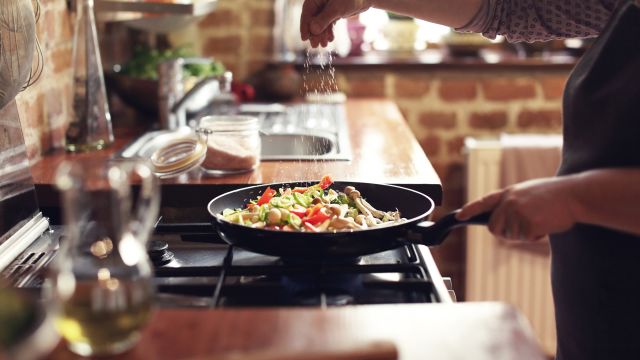Photo Credit: Peppered Jane, via Flickr Creative Commons
When does following a low-salt diet really matter? Find out from Carra Richling, from Ornish Lifestyle Medicine.
The relationship between how much salt we consume and the development of hypertension has been debated for decades. Hypertension, or high blood pressure, is a common, but dangerous condition. High blood pressure increases your risk for heart disease, stroke, kidney disease and dementia. Approximately one in three adults in America have hypertension, but many are unaware they have it because there are no warning signs.
Why you should follow AHA recommendations
Recent studies have shown that a certain amount of salt consumption may not be harmful. Researchers found that there is a strong connection between salt consumption and hypertension primarily if a person has a sensitivity to salt. Because salt sensitivity is still very difficult to pinpoint, however, the best practice is for everyone to continue to limit excess sodium. The consensus of the American Heart Association and other public health organizations is that excess sodium has a significant impact on hypertension, and recommends limiting salt consumption to 1500 milligrams a day.
Why we crave salt
Your body does need some sodium to maintain the proper balance of fluids, transmit nerve impulses and contract and relax your muscles—but these functions require only 500 mg per day. On average, Americans consume 3400 milligrams of sodium per day, which is twice the recommended amount. It’s estimated that almost 80 percent of sodium intake comes from packaged, processed foods and foods from restaurants.
Studies suggest that salt cravings may be addictive. A 2011 study published in PNAS by Duke University and Australian researchers found that dopamine, the neurotransmitter that makes us feel good, is released when we consume salt. A craving for dopamine-induced pleasure becomes even stronger when we feel stress. Even though salt itself is not addictive, the dopamine release we experiencing after consuming salt can be addictive and therefore, makes us crave more salt.
The great salt debate
Conflicting research about salt consumption contributes to public confusion. A 2014 meta-analysis study published in the American Journal of Hypertension that compared mortality rates and frequency of cardiovascular events from both a high and low sodium intake concluded that people who consumed up to 4900 mg a day had a lower risk of death and cardiovascular events than those with lower and higher intakes. This study received a lot of public attention because it went against the long-standing message about the benefits of limiting salt.
Another July 2016 study published in The Lancet showed similar results. This study examined the association between sodium, cardiovascular disease and death from all causes. Overall, those who consumed less than 3000 mg of sodium on average had poorer health than those who consumed a moderate amount (between 4000 mg and 5000 mg). Those who consumed over 7000 mg of salt had harmful health outcomes only if they were sensitive to salt. The study found a high sodium intake is associated with an increased risk of cardiovascular events and death in people with hypertension and sensitivity to salt, but there was no association in those who did not have hypertension. The bottom line? It’s best for those with hypertension to decrease the amount of salt they consume.
Understanding salt sensitivity
Newer gene studies are shedding light on the mixed messages around salt consumption. Some individuals are genetically “salt sensitive” or “salt resistant,” which impacts their response to salt.
Salt sensitivity has been associated with increased cardiovascular disease and reduced survival even in salt sensitive individual without hypertension, which is why it’s important to identify salt sensitivity.
The problem is that accurate testing of salt sensitivity is labor intensive and expensive. At this time there are no laboratory tests for salt sensitivity, so it is difficult to detect if someone is sodium sensitive, especially when they don’t exhibit symptoms of hypertension. Salt sensitivity and resistance can be influenced by race and ethnicity, age, body mass and diet. For example, older people, people of African descent and women tend to be sensitive to salt.
Salt sensitivity can be managed by improving the overall quality of one’s diet: eating whole foods, reducing sodium, avoiding or limiting packaged or processed foods and eating foods rich in potassium.
Tips on managing salt sensitivity
Adopt a healthy lifestyle such as The Ornish Lifestyle Program.
- Avoid or limit processed, packaged foods.
- Limit baked goods.
- Avoid adding salt to food. Use other flavor enhancers such as spices.
- Adopt a plant-based diet, rich in minerals such as potassium, magnesium and calcium.
- Read Labels. A low sodium product is < 140 mg sodium per serving.
Looking for other ways to eat more healthily? Reverse heart disease and diabetes, lose weight and reduce your risk of cancer with these tips from Dean Ornish.
This content was originally published on Ornish Living.






